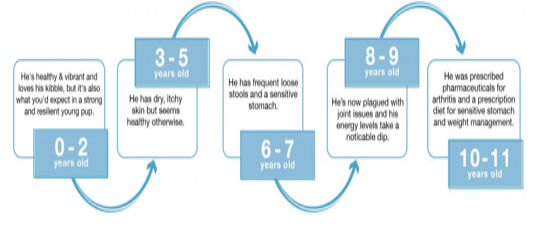5 Supplements Your Dog Needs
Why is supplementing important? When do I start? How do I
even know it’s working?
All valid questions! Let’s start with why it’s important to
supplement using this entirely made-up but altogether likely story of a dog fed
a lifetime of dry food (kibble).
That kibble-fed dog missed out on a number of nutrients that
were crucial to his health and well-being because they just aren’t found in
processed, shelf-stable pet food.
Supplementation would simply aim to add missing ingredients not being met
through diet to support health and wellness because at its core,
supplementation is really about preventative care. It’s a concept that anyone
who brushes their teeth or gets their oil changed every 3,000 miles(ish) is
familiar with. The goal is to address something before problems develop.
Okay… but when do I start?!
Dogs are resilient so you won’t see issues at 1 or 2 years
old, maybe not even at 5 years old. But when you can actually see the symptoms,
their bodies are already in trouble and that’s why you don’t wait to just
manage or patch the issues. You want to start supplementing their diet as soon
as you can.
Oh, my stars and stripes. I’m too late. All is lost.
It’s never too late to start. Every single dog (and cat!)
can benefit from supplementation at any age. Following are 5 supplements that
will benefit every dog that is fed a dry food diet.
#1 Support their Joints
In the wild if a dog devoured his prey, he would eat the
joint capsule, joint fluid, and the cartilage caps of the bones. After
ingesting it, it would nourish his joints providing them the building blocks
needed for joint health: glucosamine, hyaluronic acid, and chondroitin. There is no kibble in existence that has
adequate levels of these joint-supporting ingredients, so if your pup is living
on dry food alone, they need an alternative source for these joint fluids.
Add whole foods like fermented fish stock or raw chicken
necks to their diet or consider a joint supplement.
#2 Omegas, Omegas and More Omegas
Omega 3 and Omega 6 are polyunsaturated fats known as
“essential” fatty acids. Omega 3s and 6s are vital to your pup’s diet because
he can’t produce them on his own. In
general, most dogs get enough of Omega 6 with their food. But the majority
of dry food lacks adequate amounts of Omega 3-fatty acids. High temperature
processing eliminates the Omega-3 fatty acids and, because its expensive, most
pet food companies aren’t adding Omega-3s back into their pet food after
processing. In fact, most of the polyunsaturated fats that are in a guaranteed
analysis comes from Omega 6s - the fatty acids that tend to be
pro-inflammatory.
Some of the best sources of active, ready-to-use Omega 3s
are fish, anchovies and krill, grass-fed meats and organs. Omega 6 can be found
in meats as well as flaxseed, nuts, and seeds, but generally are most commonly
found in oils such as canola and vegetable oil. You may want to consider a supplement that
combines active, ready-to-use Omega 3 with quality Omega 6s.
#3 A Healthy Gut is a Happy Dog
Gut health is entwined with bowel and intestinal well-being
as a whole. An overgrowth of “bad” bacteria in the gut is often to blame for
symptoms like bloating, stinky gas, even occasional diarrhea, but that can be
combatted with probiotics.
In shelf stable foods like kibble, the FDA has a zero-tolerance
policy for “bad” bacteria within the food. But in the process of eliminating pathogens, the
good, healthy bacteria that’s necessary for a good gut biome is also destroyed.
So, when you’re feeding a sterile food, you’re not giving them pathogens, which
is great, but you’re also not giving them the beneficial “good” bacteria that
the gut biome needs.
While many dog foods claim to have probiotics, there isn’t
usually enough and the manufacturing process most often causes any probiotic
benefit to be useless. Raw goat’s milk, fermented foods, yogurt and supplemental
powders are excellent sources of probiotics.
#4 Dental Health
As carnivores, dogs have physiological traits developed
specifically for what they’re meant to eat. They have tightly-interdigitated
teeth for ripping and tearing prey, a shortened gastrointestinal tract to
digest raw meat, and little to no salivary amylase (i.e. the enzyme that breaks
down sugars or carbohydrates). So, dogs eating kibble tend to consume more
carbohydrates which contributes to dental tartar.
That breath-takingly unbearable doggy breath for example, is
often due to tartar buildup and bacteria on the surface of the teeth. Switching
to a raw or freeze-dried food with low
level of carbohydrates can drastically help reduce tartar buildup. Chewing on bones is also a great way to
naturally clean their teeth. Consult
your vet to address tarter build-up that is already present.
#5 A Daily Dose of Antioxidants
Antioxidants can come from either what we produce in our own
bodies or what we consume in our diets. As we age, our own antioxidant levels
start to decrease and, if we don’t increase our dietary antioxidant levels,
then our bodies are susceptible to a whole host of health problems. Supplementing antioxidants can be as easy as
adding brightly-colored fruits and vegetables every day. Or consider
antioxidant supplements with incredibly concentrated amounts of antioxidants
from whole foods.
Joint care, more omegas, gut health, pearly whites, and a
daily dose of antioxidants– these are easy additions to help every kibble-fed
dog live a more vibrant, healthy life.
Article is from Herbsmith, a company founded by holistic veterinarian Dr. Chris Bessent
and dedicated to inspiring a lifetime of health and wellness. To learn more
about Herbsmith, visit them online at www.herbsmithinc.com
Founded and operated by
holistic veterinarian, Dr.

